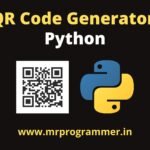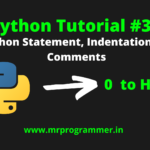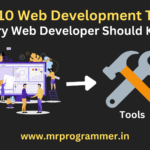Python is a powerful and versatile programming language well known for its simplicity and readability. Python is built for Both an Experienced vs A Newbie Programmer. Learning Python is a Good Option For Stepping Into the Field of Coding. Learn Python In 30 Days, In this post we will provide you with a step-by-step guide For learning Python in 30 days.
Recommended Course:

Python Course For Beginners
₹155.00
Table of Contents
Day 1-5: Learning the Basics of Python
In the First 1-5 Days, Start With the Basics of Learning Python. To Get Started with Python Learn the Following Topics In Python:
- Basic Syntax
- Variables
- Data Types
- Basic Operations
Then, Dive Into Topics such as Arithmetic, Strings, Lists, and Tuples. Be Familiar With the Control Flow Structures including if statements and loops. Practice writing simple programs and solving small coding problems to solidify your understanding of the fundamentals.
Day 6-10: Learning Functions and Modules In Python
In the Next 6-10 Days, Explore the power of functions and Learn How to define your own functions, pass arguments, and return values. Understand the concept of scope and how it affects variable accessibility. Additionally, Discover the usefulness of modules in Python. Modules are pre-written code that you can import to extend Python’s Capabilities. Explore built-in modules and learn how to install and use third-party modules to enhance your programs.
Day 11-15: Learning Data Structures In Python
From Days 11-15, Learning Data Structures because Data Structure is Essential like dictionaries, sets, and arrays, Understand their properties, advantages, and use cases. Learn How to manipulate and access elements within these structures. Gain Knowledge About common algorithms such as searching and sorting and practice implementing them in Python.
Day 16-20: File Handling and Exception Handling
File Handling allows you to read and write to files. Discover how to open, read, write, and close files in Python. Explore different file modes and learn to handle exceptions that may occur during file operations. Understand how to catch and handle errors carefully to prevent program crashes and unexpected behavior.
Day 21-25: Learning OOP (Object-Oriented Programming)
Object Oriented Programming (OOP) is a powerful paradigm used to structure code. In OOP, Learn About Classes, Objects, Attributes, and Methods. Understand the Concepts of Inheritance, Encapsulation, and polymorphism. Practice Designing and implementing your own classes and explore the benefits of OOP in creating modular and reusable code.
Day 26-30: Learning Some Advanced Topics
In the final phase, of Learning Python Programming, Dive into some advanced topics that match your interest. This could include topics such as regular expressions, database connectivity, web scraping, or data visualization. Undertake small projects that combine your newly acquired knowledge to reinforce your skills and build confidence.
Conclusion
Congratulations! You have Completed your 30 Days Python Learning Challenge. Throughout the Journey, You have acquired a solid foundation in Python Programming. Note That Learning Python is an ongoing process, and there is always more to explore. Embrace the Python community, participate in coding challenges, and continue building your skills. Python opens doors to various career opportunities, from web development to data analysis and artificial intelligence. So Continue Learning Python and Build Projects to Get Hands-On Experience In Python.
Note that Learning Python In 30 Days Requires dedication and consistent effort. The suggested learning timeliness is flexible and you can adjust it to fit your learning pace and goals.
- Introduction to Entrepreneurship: Everything You Need to Know Before You Start - June 12, 2025
- What Sets Artificial Intelligence Apart from Humans? - April 18, 2025
- Python Programming: A Comprehensive Guide for Beginners - March 27, 2025









One comment